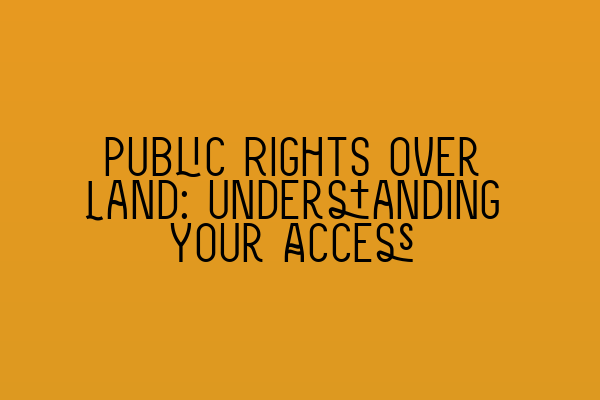Public Rights over Land: Understanding Your Access
At SQE Property Law & Land Law, we understand the importance of public rights over land and the need for individuals to have a clear understanding of their access. Public rights over land refer to the legal rights that allow members of the public to access and use certain areas of land, even if the land is privately owned. These rights are crucial in ensuring equitable access to public spaces and amenities.
Understanding public rights over land can be complex, but it is essential for both property owners and the public to know their rights and obligations. In this blog post, we will provide an overview of public rights over land, explain the different types of access, and clarify the legal framework governing these rights.
Types of Public Rights over Land
There are various types of public rights over land, each with its own set of regulations and restrictions. Understanding the different types of access can help both landowners and the public navigate their rights and responsibilities.
1. Public Rights of Way: Public rights of way refer to the right to access and travel on specific routes, such as footpaths, bridleways, and byways, which are usually marked by signposts or indicated on maps. These rights allow the public to use these routes for recreational purposes, commuting, or accessing other areas of land. Landowners must ensure that public rights of way within their land are properly maintained and accessible.
2. Access to Navigable Water: Rivers, canals, and other water bodies deemed navigable by law are considered public highways. This means that the public has the right to access and navigate these waterways freely. However, restrictions may apply in certain areas, such as private docks or restricted water zones. It is important to respect any specific regulations or guidelines regarding access to navigable water.
3. Public Parks and Open Spaces: Public parks and open spaces are vital for communities, providing recreational areas for individuals to enjoy. These spaces are typically owned and maintained by local authorities but are open to the public for leisure activities, such as picnics, sports, and gatherings. Landowners should be aware of the rights of the public to access and use these areas and ensure they are maintained in good condition.
Legal Framework and Responsibilities
The legal framework governing public rights over land varies depending on the jurisdiction and specific regulations in place. In the United Kingdom, for example, the rights of way legislation differs in England and Wales, Scotland, and Northern Ireland. It is important to seek professional legal advice to understand the specific laws applicable to your area.
As a landowner, it is your responsibility to respect and accommodate public rights over your land. This includes keeping public rights of way clear and accessible, maintaining safe conditions, and ensuring any necessary repairs or maintenance are carried out promptly. Failure to adhere to these responsibilities can result in legal disputes and potential loss of public access rights.
For the public, it is crucial to use public rights over land responsibly and respect the rights of property owners. This includes staying on designated paths, not causing damage to property or land, and adhering to any specific regulations or restrictions in place. By using public rights over land responsibly, we can all contribute to maintaining a harmonious relationship between landowners and the public.
Conclusion
Understanding public rights over land is essential for both property owners and the public. It ensures equitable access to public spaces and amenities, promoting a sense of community and facilitating recreational activities. At SQE Property Law & Land Law, we strive to provide comprehensive legal advice and guidance on public rights over land. If you require assistance or have any queries regarding your access rights or land ownership, do not hesitate to contact our team of experts.
Related Articles:
– SQE 1 Practice Exam Questions
– SQE 1 Practice Mocks FLK1 FLK2
– SQE 2 Preparation Courses
– SQE 1 Preparation Courses
– SRA SQE Exam Dates
